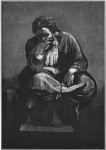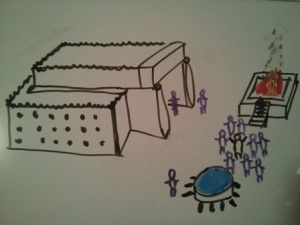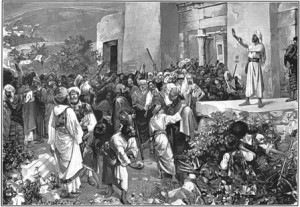From Jeremiah 26-29
 Long post alert. Jeremiah is commanded by the LORD to preach in the temple. He proclaims the LORD’s word and they hate it. Today’s passage involves a Jewish law court. The religious authorities do not being rebuked by this lone man. They refuse to repent. They want his blood. Jeremiah is delivered from their grasp. Another was not so blessed. In the gospel Jesus fits nicely into Jeremiah’s mold. The Pharisees and teachers of the law didn’t like his message either.
Long post alert. Jeremiah is commanded by the LORD to preach in the temple. He proclaims the LORD’s word and they hate it. Today’s passage involves a Jewish law court. The religious authorities do not being rebuked by this lone man. They refuse to repent. They want his blood. Jeremiah is delivered from their grasp. Another was not so blessed. In the gospel Jesus fits nicely into Jeremiah’s mold. The Pharisees and teachers of the law didn’t like his message either.
This post is part of my bible in a year series.
Passage and Comment
Jeremiah is instructed by the LORD to do something dangerous. He asks him to go to Jerusalem’s religious centre, the temple of all places and preach. ‘How is that dangerous?’ you ask. Read on and find out.
26 In the beginning of the reign of Jehoiakim the son of Josiah, king of Judah, this word came from the LORD: 2 “Thus says the LORD: Stand in the court of the LORD’s house, and speak to all the cities of Judah that come to worship in the house of the LORD all the words that I command you to speak to them; do not hold back a word. 3 It may be they will listen, and every one turn from his evil way, that I may relent of the disaster that I intend to do to them because of their evil deeds. (Jer 26.1-3)
Jeremiah is meant to go into the house of the LORD, otherwise known as the temple. There he is commanded to speak the word of the LORD. That seems fine. The temple was where people offered sacrifices to the LORD, where they prayed, where they asked forgiveness, and where the priests taught the law. In other words – worshipped.
It is dangerous because the people who are in the temple are in rebellion against the LORD. Their way is evil. Yet they still go to the temple. Why would people who persist in evil still want to go to the temple?
There is something deeply wrong with what is happening here. Jeremiah should be going to a sacred place. Instead the LORD has sent him into a den of robbers (Jer 7.11).
The people of Judah who persist in evil still continue to worship in the temple. The Lord sends Jeremiah to speak to them with the intention they will listen and turn away from their evil. If they do this then the LORD does not have to punish them and send disaster. The LORD wants to be forgiving and compassionate. He is giving them another chance.
Here is the message the LORD wants him to proclaim.
4 You shall say to them, ‘Thus says the LORD: If you will not listen to me, to walk in my law that I have set before you, 5 and to listen to the words of my servants the prophets whom I send to you urgently, though you have not listened, 6 then I will make this house like Shiloh, and I will make this city a curse for all the nations of the earth.’ ” (Jer 26.4-6)
Listen and walk. Listen to the LORD and his prophets. Walk in his law.
Jeremiah’s message is fairly simple. Problem is they are not doing this. If they will not do this the LORD will make them like Shiloh.
“Shiloh is a town identified with Tell Seilun located 10 miles northeast of Bethel, 12 miles southeast of Shechem, and 3 miles east of the road between Shechem and Jerusalem, precisely fitting the description of its location in Judges 21:19. … Joshua established the tabernacle there (Jos 18:1), and Shiloh became the center of religious life during the period of the judges. … When the ark was taken from Shiloh to battle, news of its loss to the Philistines reached Eli and brought about his death (4:1–18). The ark was never returned to Shiloh; the psalmist records that God had “abandoned the tabernacle of Shiloh, the tent he had set up among men” (Ps 78:60). Some scholars associate the fact that the ark was not returned to Shiloh but to Kiriathjearim with an assumed destruction under the Philistines around 1050 B.C. Over 400 years later Jeremiah does use the destruction of Shiloh as a model for what he prophesied would happen to Jerusalem (Jer 7:12–14; 26:6–9).” (Elwell, W. A., & Beitzel, B. J. (1988). In Baker encyclopedia of the Bible (p. 1952). Grand Rapids, MI: Baker Book House.)
Shiloh was used as a religious centre before Jerusalem. Shiloh was destroyed. Now the LORD threatens the same will happen to Jerusalem if they do not listen and walk.
7 The priests and the prophets and all the people heard Jeremiah speaking these words in the house of the LORD. 8 And when Jeremiah had finished speaking all that the LORD had commanded him to speak to all the people, then the priests and the prophets and all the people laid hold of him, saying, “You shall die! 9 Why have you prophesied in the name of the LORD, saying, ‘This house shall be like Shiloh, and this city shall be desolate, without inhabitant’?” And all the people gathered around Jeremiah in the house of the LORD. (Jer 26.7-9)
The ‘priests’, the ‘prophets’ and all the people in the temple gathered around Jeremiah. They didn’t like his message. They didn’t like being compared to Shiloh. It must have been intimidating for Jeremiah to be surrounded like this.
They should have listened to the LORD. They should have walked according to his law. Instead they gathered around Jeremiah and threatened him.
The commotion causes a bit of a stir in the city. Someone must have quickly brought word to the king’s officials.
10 When the officials of Judah heard these things, they came up from the king’s house to the house of the LORD and took their seat in the entry of the New Gate of the house of the LORD. 11 Then the priests and the prophets said to the officials and to all the people, “This man deserves the sentence of death, because he has prophesied against this city, as you have heard with your own ears.” (Jer 26.10-11)
The people have turned into a lynch mob. They want Jeremiah dead.
12 Then Jeremiah spoke to all the officials and all the people, saying, “The LORD sent me to prophesy against this house and this city all the words you have heard. 13 Now therefore mend your ways and your deeds, and obey the voice of the LORD your God, and the LORD will relent of the disaster that he has pronounced against you. 14 But as for me, behold, I am in your hands. Do with me as seems good and right to you. 15 Only know for certain that if you put me to death, you will bring innocent blood upon yourselves and upon this city and its inhabitants, for in truth the LORD sent me to you to speak all these words in your ears.” (Jer 26.12-15)
He was sent by the LORD for their benefit. He wants them to mend their ways and deeds and obey the voice of the LORD.
What do you think of Jeremiah’s stand? What does it take to convince religious people they are in the wrong? What steps can you take to make sure you are not religious like them?
Jeremiah accepts his fate. He knows he is innocent and is sent by the LORD. He knows if they kill him they will be punished.
Some people rise up to his defense.
16 Then the officials and all the people said to the priests and the prophets, “This man does not deserve the sentence of death, for he has spoken to us in the name of the LORD our God.” 17 And certain of the elders of the land arose and spoke to all the assembled people, saying, 18 “Micah of Moresheth prophesied in the days of Hezekiah king of Judah, and said to all the people of Judah: ‘Thus says the LORD of hosts,
“ ‘Zion shall be plowed as a field; Jerusalem shall become a heap of ruins, and the mountain of the house a wooded height.’
19 Did Hezekiah king of Judah and all Judah put him to death? Did he not fear the LORD and entreat the favor of the LORD, and did not the LORD relent of the disaster that he had pronounced against them? But we are about to bring great disaster upon ourselves.” (Jer 26.16-19)
They remember a time in the past when another prophesied against Jerusalem. Hezekiah, a good king at that time respected his word. He did not put him to death. In consequence the LORD relented from bringing disaster on them. The people around Jeremiah should learn from his example.
They did not kill Jeremiah. They ended up killing another prophet.
20 There was another man who prophesied in the name of the LORD, Uriah the son of Shemaiah from Kiriath-jearim. He prophesied against this city and against this land in words like those of Jeremiah. 21 And when King Jehoiakim, with all his warriors and all the officials, heard his words, the king sought to put him to death. But when Uriah heard of it, he was afraid and fled and escaped to Egypt. 22 Then King Jehoiakim sent to Egypt certain men, Elnathan the son of Achbor and others with him, 23 and they took Uriah from Egypt and brought him to King Jehoiakim, who struck him down with the sword and dumped his dead body into the burial place of the common people. (Jer 26.20-23)
Uriah was another prophet who prophesied as Jeremiah did. He tried to escape from those who sought his life. Unfortunately he was found and eventually killed.
24 But the hand of Ahikam the son of Shaphan was with Jeremiah so that he was not given over to the people to be put to death. (Jer 26.24)
Jeremiah was spared. Ahikam the son of Shaphan played a big part in his salvation. King Jehoiakim had Uriah murdered.
Story of Israel

In this passage we have a great example of a Jewish court of law.
“The Accusers. The leading accusers are priests and prophets. The priests, also, were foremost in the accusation of our Lord. Jeremiah had threatened the temple; it is not wonderful that temple officials should be enraged with him. Religious persecution is generally instigated by the professional clerical class, whose vested interests have been attacked by the reformer. The prophets were directly opposed by the teaching of Jeremiah. If orthodoxy is to be decided by the vote of the majority, they were the orthodox of their day. They were annoyed by the contradiction of the greatest man of their order. Unable to answer him, they tried to suppress him. The conduct of these men may suggest some general lessons, viz.
(1) fidelity to the ordinances of worship is no proof of fidelity to God;
(2) professional religiousness may be far removed from religiousness of character;
(3) they who claim to be regular teachers of religion may be the last to recognize fresh truth;
…
The Accused. 1. Jeremiah remains faithful to his message. He reiterates it with new emphatic warnings. His defence is that he is sent by God to speak as he has spoken. He rests on innocence, truth, Divine authority. With such a plea he dare not recant. The true servants of God will know that they ought to “obey God rather than men,”
…
The Judges. The princes and elders seem to have the position of judges. They are cool and impartial. In the Jewish state the office of judge came with birth and rank. The most radical friend of the people may see that the superior culture and freedom from popular passions of these men may have fitted them in some measure for their work. Unhappily, Jeremiah has exposed another side of their character. It speaks well for them, however, after the severe castigation he had given “the shepherds” (e.g. ch. 25:34–38), that they had the magnanimity to lend the prophet an impartial hearing, in spite of the virulent opposition of the priests.
…
The Judy. The assembly of the people seems to have acted as a jury. The priests and prophets present their accusation to them and the princes. The people and the princes pronounce the opinion that Jeremiah is innocent. The elders address themselves exclusively to the assembly of the people. This assembly shows the weakness of a popular concourse. The people are swayed from side to side. First they side with the priests, then with the rulers. It also shows its advantages. The people are open to impression; they do not care for formal consistency to a previous conviction; they like to see fair play. When their broad human instincts are appealed to they respond rightly.
(Spence-Jones, H. D. M. (Ed.). (1909). Jeremiah (Vol. 1, p. 566-7). London; New York: Funk & Wagnalls Company.)
Story of Jesus
The Jeremiah passage anticipates another condemnation in the temple. Another trial of an innocent man. Jesus recalls this and similar instances in the gospel. He has his own showdown in the temple with the religious authorities.
27 “Woe to you, scribes and Pharisees, hypocrites! For you are like whitewashed tombs, which outwardly appear beautiful, but within are full of dead people’s bones and all uncleanness. 28 So you also outwardly appear righteous to others, but within you are full of hypocrisy and lawlessness.
29 “Woe to you, scribes and Pharisees, hypocrites! For you build the tombs of the prophets and decorate the monuments of the righteous, 30 saying, ‘If we had lived in the days of our fathers, we would not have taken part with them in shedding the blood of the prophets.’ 31 Thus you witness against yourselves that you are sons of those who murdered the prophets. 32 Fill up, then, the measure of your fathers. 33 You serpents, you brood of vipers, how are you to escape being sentenced to hell? 34 Therefore I send you prophets and wise men and scribes, some of whom you will kill and crucify, and some you will flog in your synagogues and persecute from town to town, 35 so that on you may come all the righteous blood shed on earth, from the blood of righteous Abel to the blood of Zechariah the son of Barachiah, whom you murdered between the sanctuary and the altar. 36 Truly, I say to you, all these things will come upon this generation.
37 “O Jerusalem, Jerusalem, the city that kills the prophets and stones those who are sent to it! How often would I have gathered your children together as a hen gathers her brood under her wings, and you were not willing! 38 See, your house is left to you desolate. 39 For I tell you, you will not see me again, until you say, ‘Blessed is he who comes in the name of the Lord.’ ” (Mt 23:27–39)
Jesus warned them against oncoming judgment. As with Jeremiah they didn’t listen. They took Jesus to trial and had him crucified. Bringing innocent blood upon themselves and upon the city and its inhabitants. In c.e. 70 they were punished for their sins. The temple was destroyed, the city sacked.
Copyright © Joshua Washington and thescripturesays, 2015. All Rights Reserved.


